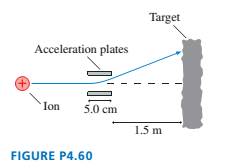Problem 1CQ: a. At this instant, is the particle in FIGURE Q4.1 speeding up, slowing down, or traveling at... Problem 2CQ: a. At this instant, is the particle in FIGURE Q4.2 speeding up, slowing down, or traveling at... Problem 3CQ: Tarzan swings through the jungle by hanging from a vine. a. Immediately after stepping off a branch... Problem 4CQ: A projectile is launched at an angle of 30°. a. Is there any point on the trajectory where and are... Problem 5CQ: For a projectile, which of the following quantities are constant during the flight: x, y, r, vx,... Problem 6CQ: A cart that is rolling at constant velocity on a level table fires a ball straight up. a. When the... Problem 7CQ: A rock is thrown from a bridge at an angle 30° below horizontal. Immediately after the rock is... Problem 8CQ: Anita is running to the right at 5 m/s in FIGURE Q4.8. Balls I and 2 are thrown toward her by... Problem 9CQ: An electromagnet on the ceiling of an airplane holds a steel ball. When a button is pushed, the... Problem 10CQ: Zack is driving past his house in FIGURE Q4.1O. He wants to toss his physics book out the window and... Problem 11CQ: II. In FIGURE Q4.11. Yvette and Zack are driving down the freeway side by side with their windows... Problem 12CQ: In uniform circular motion, which of the following quantities are constant: speed, instantaneous... Problem 13CQ: FIGURE Q4.13 shows three points on a steadily rotating wh1. a. Rank in order, from largest to... Problem 14CQ: FIGURE Q4.14 shows four rotating wheels. For each, determine the signs (+ or -) of w and a. Problem 15CQ: FIGURE Q4.15 shows a pendulum at one end point of its arc. a. At this point, is w positive,... Problem 1EAP: Problems I and 2 show a partial motion diagram. For each: a. Complete the motion diagram by adding... Problem 2EAP Problem 3EAP: Answer Problems 3 through 5 by choosing one of the eight labeled acceleration vectors or selecting... Problem 4EAP: Answer Problems 3 through 5 by choosing one of the eight labeled acceleration vectors or selecting... Problem 5EAP: Answer Problems 3 through 5 by choosing one of the eight labeled acceleration vectors or selecting... Problem 6EAP: A rocket-powered hockey puck moves on a horizontal friction- less table. FIGURE EX4.6 shows graphs... Problem 7EAP: A rocket-powered hockey puck moves on a horizontal frictionless table. FIGURE EX4.7 shows graphs of... Problem 8EAP Problem 9EAP: A particle moving in the xy- plane has velocity v =(2 ti + (3 t2)j ) m/s, where t is in s. What is... Problem 10EAP: You have a remote-controlled car that has been programmed to have velocity v = (-3 ti + 2t2j ) m/s,... Problem 11EAP: A ball thrown horizontally at 25 m/s travels a horizontal distance of 50 m before hitting the... Problem 12EAP: A physics student on the Planet Exidor throws a ball, and its follows the parabolic trajectory shown... Problem 13EAP: A supply plane needs to drop a package of food to scientists working on a glacier in Greenland. The... Problem 14EAP: A rifle is aimed horizontally at a target 50 m away. The bullet hits the target 2.0 cm below the aim... Problem 15EAP: In the Olympic shotput event, an athlete throws the shot with an initial speed of 12.0 m/s at a... Problem 16EAP: On the Apollo 14 mission to the moon, astronaut Alan Shepard hit a golf ball with a 6 iron. The... Problem 17EAP: A baseball player friend of yours wants to determine his pitching speed. You have him stand on a... Problem 18EAP: A boat takes 3.0 hours to travel 30 km down a river, then 5.0 hours to return. How fast is the river... Problem 19EAP: When the moving sidewalk at the airport is broken, as it often seems to be, it takes you 50 s to... Problem 20EAP Problem 21EAP: A kayaker, needs to paddle north across a 100-m-wide harbor. The tide is going out, creating a tidal... Problem 22EAP: Susan, driving north at 60 mph, and Trent, driving east at 45 mph, are approaching an intersection.... Problem 23EAP: FIGURE EX4.23 shows the angular-velocity-versus-time graph for a particle moving in a circle. How... Problem 24EAP: FIGURE EX4.24 shows the angular-position-versus-time graph for a particle moving in a circle. What... Problem 25EAP: FIGURE EX4.25 shows the angular-velocity-versus-time graph for a particle moving in a circle,... Problem 26EAP: The earth’s radius is about 4000 miles. Kampala, the capital of Uganda, and Singapore are both... Problem 27EAP: An old-fashioned single-play vinyl record rotates on a turntable at 45 rpm. What are (a) the angular... Problem 28EAP: As the earth mates, what is the speed of (a) a physics student in Miami. Florida. at latitude 26°,... Problem 29EAP: How fast must a plane fly along the earth’s equator so that the sun stands still relative to the... Problem 30EAP: A 3000-rn-high mountain is located on the equator. How much faster does a climber on top of the... Problem 31EAP: Peregrine falcons are known for their maneuvering ability. In a tight circular turn, a falcon can... Problem 32EAP: To withstand “g-forces” of up to 10 g’s, caused by suddenly pulling out of a steep dive, fighter jet... Problem 33EAP: The radius of the earth’s very nearly circular orbit around the sun is 1.5 X 1011m. Find the... Problem 34EAP: A speck of dust on a spinning DVD has a centripetal acceleration of 20 m/s2. a. What is the... Problem 35EAP: Your roommate is working on his bicycle and has the bike up side down. He spins the 60-cm-diameter... Problem 36EAP: I FIGURE EX4.36 shows the angular velocity graph of the crank shaft in a car. What is the... Problem 37EAP: I FIGURE EX4.37 shows the angular acceleration graph of a turn table that starts from rest. What is... Problem 38EAP: FIGURE EX4.38 shows the angular-velocity-versus-time graph for a particle moving in a circle. How... Problem 39EAP: A wheel initially rotating at 60 rpm experiences the angular acceleration shown in FIGURE EX4.39.... Problem 40EAP: A 5.0-rn-diameter merry-go-round is initially turning with a 4.0 s period. It slows down and stops... Problem 41EAP: An electric fan goes from rest to 1800 rpm in 4.0 s. What is its angular acceleration? Problem 42EAP: A bicycle wheel is rotating at 50 rpm when the cyclist begins to pedal harder, giving the wheel a... Problem 43EAP: Starting from rest, a DVD steadily accelerates to 500 rpm in 1.0 s, rotates at this angular speed... Problem 44EAP: A spaceship maneuvering near Planet Zeta is located at r = (600î — 400j + 200k) × 103 km, relative... Problem 45EAP: equation reference goes here45. A particle moving in the xy-plane has velocity v0= v0xî + voyj at t... Problem 46EAP: A projectile’s horizontal range over level ground is v02sin 201g. At what launch angle or angles... Problem 47EAP: a. A projectile is launched with speed v0and angle . Derive an expression for the projectile’s... Problem 48EAP: A projectile is launched from ground level at angle and speed v0into a headwind that causes a... Problem 49EAP: A gray kangaroo can bound across level ground with each jump carrying it 10 m from the takeoff... Problem 50EAP: A ball is thrown toward a cliff of height h with a speed of 30 m/s and an angle of 600 above... Problem 51EAP: A tennis player hits a ball 2.0 m above the ground. The ball leaves his racquet with a speed of 20.0... Problem 52EAP: You are target shooting using a toy gun that fires a small ball at a speed of 15 m/s. When the gun... Problem 53EAP: A 35 g steel ball is held by a ceiling-mounted electromagnet 3.5 m above the floor. A compressed-air... Problem 54EAP: You are watching an archery tournament when you start wondering how fast an arrow is shot from the... Problem 55EAP: You’re 6.0 m from one wall of the house seen in FIGURE P4.55. You want to toss a ball to your friend... Problem 56EAP: Sand moves without slipping at 6.0 m/s down a conveyer that is tilted at 15°. The sand enters a pipe... Problem 57EAP: A stunt man drives a car at a speed of 20 m/s off a 30-m-high cliff. The road leading to the cliff... Problem 58EAP: A javelin thrower standing at rest holds the center of the javelin behind her head, then accelerates... Problem 59EAP: A rubber ball is dropped onto a ramp that is tilted at 20°, as shown in FIGURE P4.59. A bouncing... Problem 60EAP: You are asked to consult for the city’s research hospital, where a group of doctors is investigating... Problem 61EAP: Ships A and B leave port together. For the next two hours, ship A travels at 20 mph in a direction... Problem 62EAP: While driving north at 25 m/s during a rainstorm you notice that the rain makes an angle of 38° with... Problem 63EAP: You’ve been assigned the task of using a shaft encoder—a device that measures the angle of a shaft... Problem 64EAP Problem 65EAP Problem 66EAP: Astronauts use a centrifuge to simulate the acceleration of a rocket launch. The centrifuge takes 30... Problem 67EAP: Communications satellites are placed in a circular orbit where they stay directly over a fixed point... Problem 68EAP Problem 69EAP: A high-speed drill rotating ccw at 2400 rpm comes to a halt in 2.5s. a. What is the magnitude of the... Problem 70EAP: A turbine is spinning at 3800 rpm. Frication in the bearings is so low that it takes 10 min to coast... Problem 71EAP Problem 72EAP: The angular velocity of a process control motor is =2012t2 rad/s, where t is in seconds. a. At what... Problem 73EAP: A Ferris wheel of radius R speeds up with angular acceleration starting from rest. Find an... Problem 74EAP Problem 75EAP: A painted tooth on a spinning gear has angular acceleration =20t rad/s2, where t is in s. Its... Problem 76EAP: A car starts from rest on a curve with radius of 120 m and accelerates tangentially at 1.0 m/s2.... Problem 77EAP Problem 78EAP: In Problem 78 through 80 you are given the equations that are used to solve a problem. For each of... Problem 79EAP Problem 80EAP: In Problem 78 through 80 you are given the equations that are used to solve a problem. For each of... Problem 81EAP: In one contest at the country fair, seen in FIGURE CP4.81, a spring-loaded plunger launches a ball... Problem 82EAP Problem 83EAP Problem 84EAP Problem 85EAP format_list_bulleted



 Physics for Scientists and Engineers: Foundations...PhysicsISBN:9781133939146Author:Katz, Debora M.Publisher:Cengage Learning
Physics for Scientists and Engineers: Foundations...PhysicsISBN:9781133939146Author:Katz, Debora M.Publisher:Cengage Learning